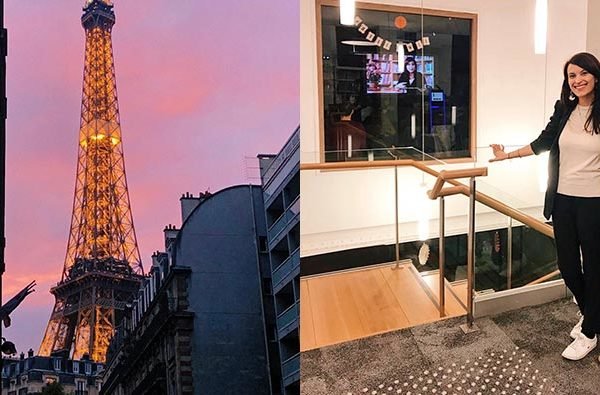Part 2: How to minimize extraction from your mobile devices
If you want to catch up on Part 1, click here.
In the spring of 2018, following the shocking revelations of the Cambridge Analytica data scandal, a movement to #DeleteFacebook picked up steam. I noticed how in online discussions on Reddit and Twitter, many people sighed a sigh of relief, saying they did not have Facebook accounts to begin with and thus they were safe from tracking. Or they had just deactivated their accounts and felt liberated from the grasp of Facebook. This is – unfortunately – a misconception.
Hundreds of millions of websites have hidden, secret trackers that measure our behavior online: which pages we visit, how long we stop to read an article or check out a video, what we click on, which device we are using, how old and expensive the device is, our exact location… all this builds a very detailed profile of us, the web users, and Facebook, along with countless other companies, collects this information – and often exploits it for advertising purposes. There is a term for it, when it concerns Facebook: “Shadow Profiles” – as in, profiles of web users who do not have a Facebook account. They are still assigned an identity by Facebook and their online behavior is meticulously tracked. Without knowledge or consent. The tech site The Verge wrote an article about this issue, if you’d like to find out more about it: “Shadow profiles are the biggest flaw in Facebook’s privacy defense”.
I have always been keen on data privacy and for years I have been using tools to minimize my “digital breadcrumbs”. Now that I am making a documentary on surveillance capitalism and the dark side of big data, my resolve to protect my privacy online has intensified.
I’d like to share with you some of the tools I use for my mobile devices – hopefully they will be helpful to you.
Apple of My Eye
Last week I wrote a post on physical tools I use to enhance my devices’ privacy: “Life Under Surveillance Capitalism: Act Like a Spy.” I did not mention it explicitly, but it’s worth bringing up the issue now: I use Apple devices – laptop computers, iPhone and Apple tablets – because they offer more privacy protection than Android or Microsoft hardware. Note that I wrote “more”. In this brave new technological age, there is no such thing as real privacy.
In The Age of Surveillance Capitalism, Shoshana Zuboff writes:
Google was the pioneer of surveillance capitalism in thought and practice, the deep pocket for research and development, and the trailblazer in experimentation and implementation, but it is no longer the only actor on this path. Surveillance capitalism quickly spread to Facebook and later to Microsoft. Evidence suggests that Amazon has veered in this direction, and it is a constant challenge to Apple, both as an external threat and as a source of internal debate and conflict.
Why do I find Android devices problematic? Zuboff explains in her book:
In September 2016 the tech newsletter the Register revealed that the Google Play app preinstalled in the latest Android phone continuously checks a user’s location, sending that information to your third-party apps as well as to Google’s own servers. One security researcher was shocked when his Android phone prompted him to download the McDonald’s app at the very moment that he crossed the threshold of the fast-food restaurant. He later discovered that Google Play had monitored his location thousands of times.
And just today, I spotted this discussion on Reddit: “My weekend with the unlocked Samsung S9+: The forced upon, un-deleteable Facebook app is collecting data while disabled. This should be illegal.”
Thus, my preference for Apple products, although I am well aware they are not perfect. I am hopeful for the new features that iOS 13 will bring in the fall. MacWorld explains: “The best thing about iOS 13 may be all the new ways Apple is protecting you from unscrupulous data collection.”
So, Apple it is for me. How do I enhance my iPhone’s privacy? Through a selective use of apps, strict privacy controls, a VPN and a browser focused on private browsing.
(1) Apps: Be Selective
I only have on my phone apps that are strictly necessary, mostly made by developers I know of and trust. My phone’s set up is incredibly minimalist, I keep all the apps I use in one folder and open them by swiping down from the top and typing their name in the search bar that appears when I swipe down.
Right now my phone hosts 61 applications – which still feels still a lot. They are mostly messaging, photography, travel and work apps. About once a week I comb through them, thinking of the Marie Kondo prompt “Does this spark joy?” and “Is this necessary?”.
I do not have any social media apps on my phone, or any news apps. I want to minimize the time I spend on the phone and use it for something useful – without letting it use me. Time, after all, is our most precious resource.
(2) Strict Privacy Settings
After keeping on my phone only apps that are absolutely essential, I typically limit the access they have to my data in Settings.
Settings > Privacy shows which apps have access to my location data, contacts, photos, microphone and camera. I typically disable access for most if not all, except in situations when it is absolutely necessary. I would recommend reviewing this information regularly and re-adjusting settings when you install a new app.
(3) VPN protection
A VPN is a virtual private network that encrypts your traffic data. As Wired explains:
Your connection with your VPN’s server is encrypted, and if you browse the wider internet through this smaller, secure network, it’s difficult for anyone to eavesdrop on what you’re doing from the outside. VPNs also take your ISP [Internet Service Provider] out of the loop on your browsing habits, because they just see endless logs of you connecting to the VPN server.
Why is this necessary? In The Age of Surveillance Capitalism (yes, I’m aware I mentioned this book often, but it is absolutely brilliant) Shoshana Zuboff explains how Internet Service Providers are moving towards surveillance capitalism as their business model.
The Center for Digital Democracy wrote about this issue in 2016:
Americans face growing new threats to their personal privacy as phone and cable Internet service providers (ISPs), along with leading Internet companies, expand their ability to capture details about what we do online in order to target us with data-driven personalized advertising. […] ISPs have formed partnerships with powerful data brokers (including Acxiom, Krux, and Oracle Marketing Cloud), gaining new insights into our online and offline behaviors. They are incorporating state-of-the-art “Big Data” practices, such as “programmatic advertising” that instantaneously buys and sells individual consumers—to financial marketers, fast-food companies, and health advertisers, for example—all without the consumer’s knowledge. In the process, ISPs have transformed TV and digital video into a vast new source of personal information, analyzing set-top box and streaming-video data for our viewing habits, and combining that information with sensitive online and offline data (including financial, health, racial, ethnic, and location) to compile detailed “digital dossiers” on millions of Americans.
The report focuses on the United States and while doing research on this issue in Europe, I discovered that thankfully European law has been much stricter, even before the introduction of GDPR.
(4) A Browser focused on Privacy
If I need to visit a website while using my iPhone, I do not use Safari… but Firefox Focus, developed by the Mozilla Foundation, which automatically blocks ads and trackers – by default. The search engine I use on it is Duck Duck Go (instead of Google), which is also focused on privacy.
…
These are some of the simple tools I use – in addition to physical accessories – to enhance my devices’ privacy.
Bonus:
For interesting discussions on online privacy and recommendations on tools to use, I highly recommend these forums on Reddit:
- Privacy: https://www.reddit.com/r/privacy/
- PrivacyToolsIO: https://www.reddit.com/r/privacytoolsIO/
I’m keen on hearing suggestions and recommendations from you in the comments.
Next week I will share which privacy tools I use on my desktop computers.
Thanks!
Ele
THE REALISTS teaser from Elena Rossini on Vimeo.




